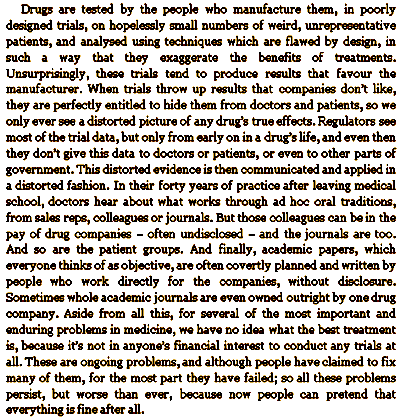WASHINGTON, D.C. [February 4, 2013] Pharmaceutical Research and Manufacturers of America (PhRMA) Executive Vice President Josie Martin issued the following statement today:
Dr. Ben Goldacre’s book Bad Pharma provides a one-sided and factually questionable view of the clinical trial process led by the innovative biopharmaceutical sector. The book ignores that the current clinical trial system, which is essential to the development of new medicines that save and improve lives, is scientifically rigorous, tightly regulated and working well. “The book’s unfounded and sensational claims may attract attention, but they do not advance biomedical science or patient health. Based on cherry-picked examples and incomplete stories, the accusations leave countless unanswered questions that could threaten public health and the development of future medicines. Criticizing the research process without acknowledging the vigorous oversight and broad commitment to safe and ethical conduct is a disservice to the tens of thousands of scientists exploring new medicines and the millions of patients hoping for cures…The demands by Dr. Goldacre and the British Medical Journal (BMJ) to release patient-level clinical trial data are irresponsible with potentially harmful consequences for future medicine development. The recommendations would jeopardize patient privacy and could serve as a deterrent to individuals considering participation in trials. It would also encourage second-guessing of the regulatory approval process, which would be disastrous for patients. The FDA has the most advanced and rigorous review process for potential new medicines and it is continuously improving its regulatory and scientific capabilities.
Why so snappy? Here’s a paragraph from the introduction to Bad Pharma:
 Ben Goldacre has been writing about these matters for quite a while, but it appears that his widely viewed TED Talks have skyrocketed him into a position of leadership. He has that combination of qualities that are tailor-made for the job: he’s
Ben Goldacre has been writing about these matters for quite a while, but it appears that his widely viewed TED Talks have skyrocketed him into a position of leadership. He has that combination of qualities that are tailor-made for the job: he’s  intelligent and knowledgeable; he’s iconoclastic; and he’s something of a court jester. Throughout the history of drama, role of truthsayer often falls to the royal fool, or an innocent child [the emperor’s new clothes], or the Greek Chorus – some unlikely character perceived as an "outsider" – someone free from the constraints and protocols of convention. The 1960s were ushered in by the Merry Pranksters and sustained by Abbie Hoffman and the Yippies.
intelligent and knowledgeable; he’s iconoclastic; and he’s something of a court jester. Throughout the history of drama, role of truthsayer often falls to the royal fool, or an innocent child [the emperor’s new clothes], or the Greek Chorus – some unlikely character perceived as an "outsider" – someone free from the constraints and protocols of convention. The 1960s were ushered in by the Merry Pranksters and sustained by Abbie Hoffman and the Yippies.
There are currently over 5,000 new medicines in the pipeline, 70 percent of which are potential first-in-class medicines that could provide exciting new approaches to treating diseases for patients. Personalized medicines and drugs for rare diseases account for a growing share of the research being conducted by the biopharmaceutical sector. Clinical trials are critical to fulfilling the promise of this robust pipeline. Our sector and other stakeholders in the trials process welcome a constructive dialogue and are focused on protecting the privacy and safety of study participants, overcoming barriers to greater participation and discovery. Debating the self-serving claims of Dr. Goldacre does nothing to advance patient health.



“I doubt that snippiness like “Debating the self-serving claims of Dr. Goldacre does nothing to advance patient health.” will carry the day in the face of this kind of evidence…”
Carry the day with whom?
1BOM, Please forgive MY snippiness, but I’m sure that Dr. Lieberman and APA will be signing on to alltrials any day now.
Thanks for the post, and links back that kept me busy into the night. Most informative!
GSK is heading the pack of guilty global pharma firms sentenced in US state courts of crimes against private patients and public coffers. According to the Guardian, CEO Andrew Witty’s take-home pay in 2011 was, in British pounds, 1m, bonus 2m, long-time pay 3,7m, approximately 67m Nkr , exchanged into USD at kr 5,5 pr dollar, from 7 kr to one dollar when we were young. We’re informed by insiders that big pharma CEO pay should be 10m pound a year, an estimated average of the biggest bosses. And we’re told that Witty is seen to be doing a good job, deserving a pay hike.
I submit that the PhRMA-executives’ pay match the member CEOs, decidedly gross and self-serving in view of how mere patients are treated with concoctions often doing more harm than good, all over medicine, and psychiatry at the top. PhRMA members “invent” medicines, and give the APA what’s needed to invent diagnoses to match. Who’ self-serving?
In Britain GSK will battle bereaved families seeking compensation after Avandia-related harm and deaths, in spite of the evidence from the US, where Avandia is estimated to have led to 100.000 heart attacks.
And then Paxil… Selfserving does not come close to what’s behind the nice facades of Big Pharma CEOs: Crime. Globally syndicated rackets.
The PhRMA statement claims that “The recommendations would jeopardize patient privacy and could serve as a deterrent to individuals considering participation in trials.” The opposite is the case… patients are turned off when those signing them up admit that there is no guarantee the results will be published. The message at present is that patients are commodities rather than partners in a principled research exercise. As for privacy, that is a non-issue and PhRMA surely knows that it is.
Yes, informed pasients may be turned off participating in trials, unless they are poor , are paid to sign up, and willing to take unknown riskes.
This is what organized trial industry does not say. The firms have a clone of PhRMA to serve collective interests, when they advertise easy access, speedy trials at lower costs in Russia, India, anywhere there are poor people , ignorance, lack of governmetal regulation, lax oversight.
Thomas Jefferson supposedly wrote that humans are the only species feeding on its own kind… Like vultures, omnivores.. He must be forgiven for having been ignorant of big Bears, big Banks and Big Pharma
to switch gears for a moment….dsm5 kappa values discussion…..
George Dawson MD seems to think that discussion of DSM5 kappa values is akin to ….”pretending psychiatry is less reliable than any other field”…
http://real-psychiatry.blogspot.com/2013/02/kappa-statistic-rhetoric.html
“Low interobserver consensus seems to be the rule rather than the exception in medicine. Psychiatry is the only specialty that openly admits this. Misdiagnosis is a universal phenomenon and I would argue that it is a basic element in the process of medical diagnosis. Some have referred to it as the “art” of medicine, but I prefer a more scientific explanation. From a neurobiological standpoint there is certainly the phenomenon of significant variability between people. Medicine from the outset has always presented itself to practitioners as a field where rational analysis produces a logical result. With the degrees of freedom inherent in biological systems that degree of certainty is an illusion at best. Pretending that psychiatry is less reliable than any other field is an equally problematic illusion, but I guess it makes for good rhetoric.”
In case my comment on Dawson’s blog is not published:
As I’ve posted elsewhere regarding comparisons between psychiatry and medical disciplines:
Among the differences, first and foremost, physicians treating a medical disease can tell when to discontinue drug therapy for lack of benefit. Second, their ethical code recommends trying lower-risk, preferably non-invasive treatments first before ratcheting up the risk level.
Psychiatry follows neither of these practices, and because of so much bad research, clinical risk-benefit assessment of medication for an individual patient is arbitrary.
In psychiatry, arbitrary diagnosis is followed by arbitrary treatment — which they don’t know when to stop — with inadequate understanding of the risk-benefit situation. Consequence: Poor outcomes with lasting adverse effects that are not tracked or studied to improve patient safety.
Admirable comment Alostrata, but one reading of Dawson’s blog is enough.
“Real Psychiatry: The reality of psychiatry and not the perception”. Which reality? Whose perception? One dimension only, doc’s preset, and comparing the mundane task of diagnosing gout to the myriad mysteries of humans, our existence, histories, passions, secrets, place and possibilities, crushing limits, fire, ashes…!?
I’d read any good book, The Fire Next Time for instance, rather than Real Psychiatry.
I agree, Dawson is a true believer who cannot be swayed.